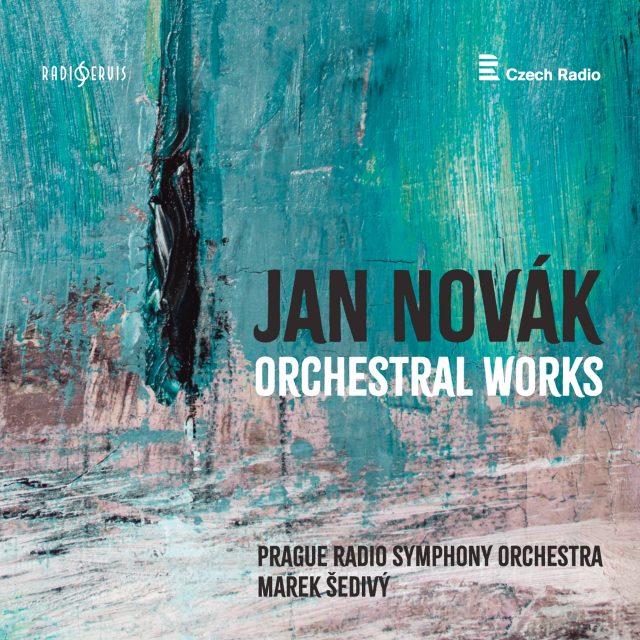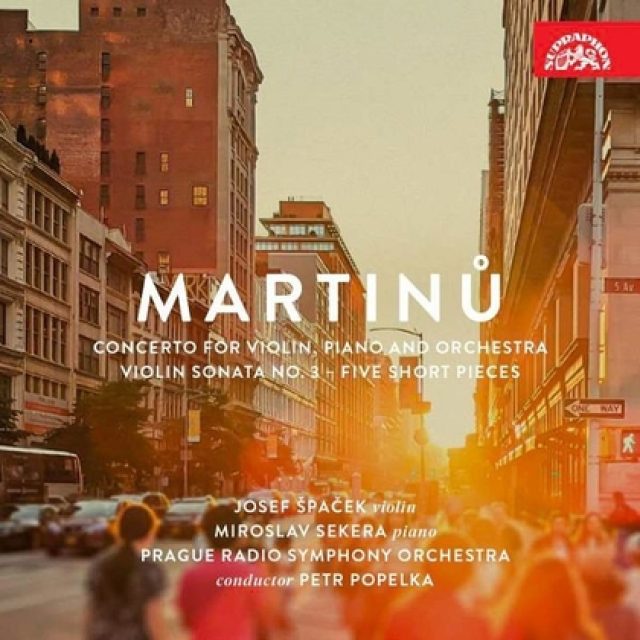Alexander Liebreich: Classical music must be played in such a way that it speaks to contemporary listeners
On 5 November, German conductor Alexander Liebreich takes charge of the Prague Radio Symphony Orchestra as its Artistic Director and Chief Conductor.
Liebreich comes from a Jewish family from Brno. He was born in Regensburg, studied Romance studies and musicology and then singing and conducting at the University of Music and Performing Arts in Munich and at Mozarteum University in Salzburg.
Besides working with the orchestra that he currently leads and appearing as a guest conductor with other orchestras, he spends a lot of his time managing different festivals, such as the Tongyeong International Music Festival in South Korea (2011–2014) or, starting this year, the Richard Strauss Festival in Garmisch-Partenkirchen. He has brought his elegant gestures, high demands on musicians and a clear idea of music to Prague from Katowice, where he was the chief conductor of the Polish National Radio Symphony Orchestra.
Do you like going to concerts?
No, I don’t. Because in those cities where I work with another orchestra I am viewed as a representative of an institution, not as a music lover. I really love dance – my wife is a ballet dancer – and if there is an interesting ballet performance, I don’t want to miss it. Like here in Prague, where I saw Kylián – Bridges of Time with this excellent artist's choreography. Of course, the conductor must go to concerts from time to time in order to hear an orchestra or an interesting soloist, but it is still part of his job.
What new ideas would you like to use to influence Prague’s musical life during your four-year stint?
That’s what we have discussed with the orchestra’s Director, Jakub Čížek, and Programme Editor, Josef Třeštík, many times. Do you know what the most important thing is? To bring life into it. Music is not a conserved museum. Music is about life. And it doesn’t matter whether we mean contemporary or Baroque music. Prague is a very traditional city. It has many museums and it is also conceived as a museum itself: just look out of this hotel’s window to see where the crowds of tourists keep going to – along the embankment to Charles Bridge, Old Town and Lesser Town…
In order to survive, music mustn’t be part of such a museum. It must reflect the city’s current life. Janáček, Brahms, Richard Strauss, Srnka, Dvořák, Mozart – all of these composers’ music can be played in such a way that it speaks to contemporary listeners. We are responsible for that, which is why I am here with the Prague Radio Symphony Orchestra.
At last year’s press conference you already talked about the responsibility of European public media in relation to radio ensembles. What’s your view on their attitude today?
The role of radio orchestras has changed significantly in the past decade. After WWII they were important tools for spreading music. People didn’t have the money to pay for concert tickets, so they listened to music on the radio. Radio broadcasting was also a source of raising public awareness, of education and broadening people’s horizons. New composers were played that had been unknown before that time.
The media – and I don’t mean only the radio – are now very powerful. At first there were recordings on CDs and now we can listen to music in streams, on Spotify, YouTube, etc. As a result, the importance of radio broadcasting is increasing. It makes us think about what national culture is and how to reflect and pass it on. How to get music over to international audiences? And how to make the domestic listener aware of what’s happening in music in the world? In this respect the radio is irreplaceable because it can easily and quickly cross borders. It provides verified information, it is intelligent and truthful…
The funding of public media, including Czech Radio, has been discussed a lot lately. Are the cost-cutting measures influencing the operation of the radio orchestra?
Yes, they are, unfortunately. I don’t want to go into details; there are still negotiations with Czech Radio’s Director General going on, but I can say that I don’t think it’s good. With huge respect for the Czech Philharmonic and the Brno Philharmonic (editorial note: Alexander Liebreich is still its honorary guest) I say that cultural life has a wider base than just a few top-class ensembles and excellent soloists. There must be a wide and varied choice. The existence of the radio orchestra is vital and we have to do all we can to defend it.
In this context you also mention the Bavarian Radio Symphony Orchestra, which also depends on licence fees, which haven’t been increased. How did they address this situation in Munich?
In my opinion, the Bavarian Radio Symphony Orchestra is the second best German orchestra after the Berlin Philharmonic. Just think of the names connected with it: Rafael Kubelík, Mariss Jansons, Colin Davis… The management said, OK, if we don’t have enough money from the licence fees, we need to find a way to get it elsewhere. That’s why the orchestra goes on tours abroad, makes recordings and approaches private sponsors.
Unfortunately, many other radio orchestras are in a similar situation. In Poland, where I used to work, it’s very similar: licence fees weren’t increased and the orchestra had difficulties. But they solved this problem differently. The radio orchestra became a national orchestra and comes under the Ministry of Culture, which funds it. We can debate whether it’s good or not because the orchestra lost part of its independence, but financially it survived.
You openly express your opinion that live performances are more important for radio orchestras than making studio recordings. Why?
To be able to give you a comprehensible answer, I need to go back in history. After WWII, many studio recordings were made and the people, who had been made poor by the war and couldn’t afford go to live concerts, listened to them. But today the situation is different. Ninety-five percent of music has been recorded in many versions and the music market is oversaturated.
So, why should we make more recordings to contribute to this collapse? Why should we make, for instance, more complete recordings of Mahler when we have Claudio Abbado’s? The DVDs with his Lucerne festival performances aren’t selling and neither are Mahler recordings by Gustavo Dudamel, who’s a real favourite of mine, by the way… So, why should we contribute to this unfortunate situation? That doesn’t make sense. Great experiences can only be provided by live concerts. Studio recordings can be part of the radio orchestra’s work but that doesn’t justify its existence. It’s not a guarantee of its survival.
What do you listen to and where?
I listen to the radio in my car. I never turn it on when I get home or when I enter a hotel room. I only listen to the morning news so that I know what has happened in the world, where a disaster has struck or how climate change impacts our lives… I don’t watch TV at all. But at night I play some recordings on YouTube, especially my favourite and beloved Claudio Abbado. I can never get enough of Mahler’s music performed by him with the Lucerne Festival Orchestra.
Your relationship to Claudio Abbado is particularly warm…
I first heard him with the Berlin Philharmonic in 1993, but I only met him personally in Munich, where he was performing Mahler’s Symphony No. 1. I was totally absorbed by his personality, his approach to music and his behaviour towards the musicians… Later on I spent two years with the Gustav Mahler Youth Orchestra, which he founded in 1986. These were beautiful years!
Your inaugural concert with the Prague Radio Symphony Orchestra on 5 of November is coming soon. How did you compile the programme? Does it include your favourite music?
I would like to explore Leoš Janáček’s music more thoroughly. That’s one of the reasons why Taras Bulba is part of the programme. I know this beautiful composition but I have never conducted it. It will be my premiere and I’m really looking forward to it. I know Jenůfa and Sinfonietta very well but Taras Bulba attracts me. I have studied it before but this will be the first time I perform it with an orchestra.
It won’t be your first time performing with oboist Vilém Veverka, who will be playing Richard Strauss’s Concerto for Oboe and Small Orchestra in D major at the November Concert. Is it pleasant and beneficial for a conductor to work with a soloist who he knows well and when he knows what to expect from him because they are mutually connected? Or does the conductor prefer to be in anticipation and be curious to see what a musician will do that he hasn’t worked with yet?
I’d say it’s both. Sometimes I am curious, sometimes not at all… However, Vilém Veverka is my good friend, we’ve known each other for a very long time and I think he’s one of the best oboe players in the world. And I also think he is a bit underrated here and doesn’t enjoy the fame he deserves although what he’s doing abroad, especially in Germany, is invaluable for the prestige of the Czech Republic. But to give you a full answer: I enjoy working with those who I get along with well and who I like playing music with…
Your concerts with the Prague Radio Symphony Orchestra in the previous season clearly showed that the orchestra pushed themselves to great performances.
That’s right. It might be because I like to perform music with good musicians and I really want the results to be as good as possible. In short: good music, no stupid sounds. That’s why I like musicians who I can achieve that with.
Dvořák’s Symphony No. 6 will be played at the Prague Radio Symphony Orchestra’s December concert. Why have you chosen this not very frequently played Dvořák composition?
Dvořák’s symphonies, such as No. 7, No. 8 and No. 9, are performed very often. So we thought, why not play something by Dvořák that audiences don’t hear as frequently? I am really curious to see what the response to it will be.
Another interesting concert will be in February. It will feature a composition by Jiří Kadeřábek commissioned by the Prague Radio Symphony Orchestra. What’s your relationship to contemporary music? Do you feel special affiliation to it?
No, I don’t. I feel affiliation to music generally. I don’t distinguish between modern, contemporary and traditional music. There are so many strange compositions in contemporary music! But I am convinced that the radio orchestra has to perform new compositions and introduce interesting contemporary composers to audiences, and it should be done several times in a season. It should happen especially in Prague, which has a long tradition of premieres. Just think of Mozart, Zemlinsky, Schönberg…
Are you happy in Prague?
I guess you don’t expect a negative answer!






